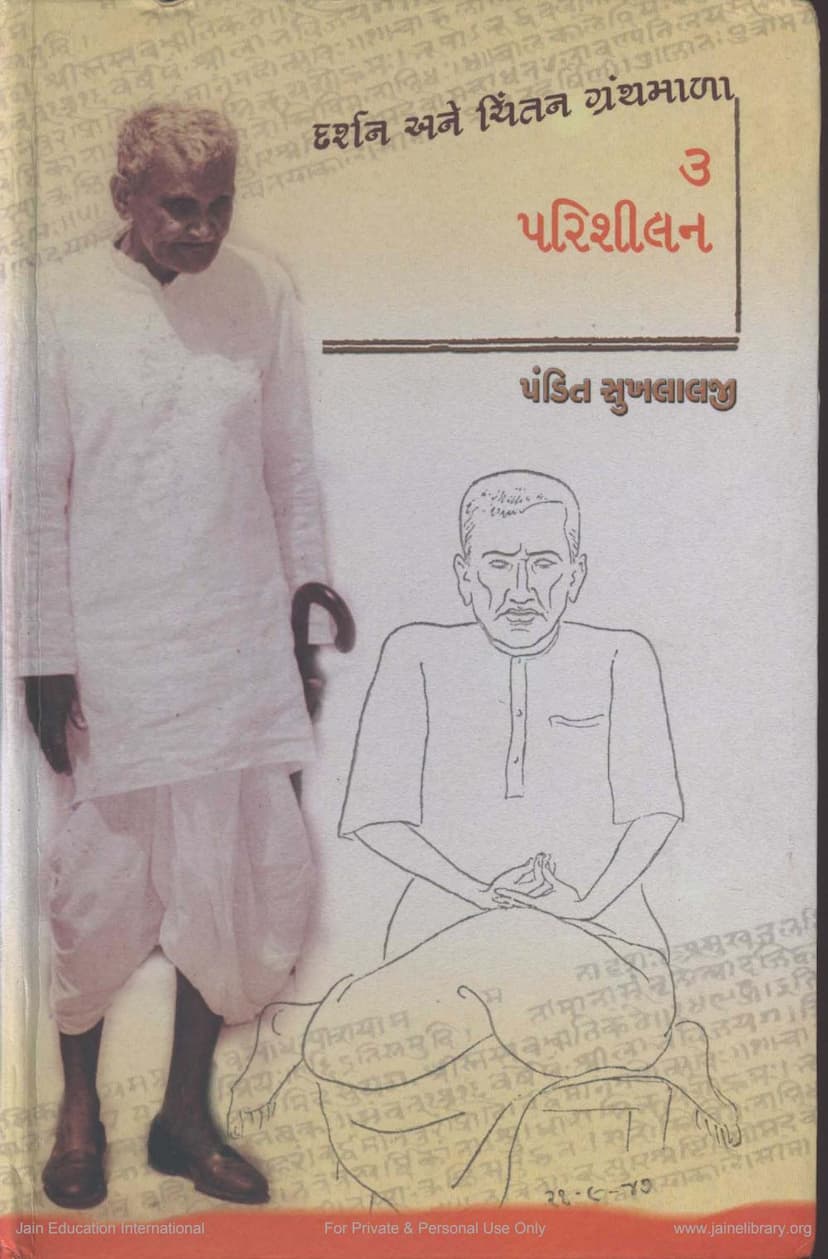Parishilan
Added to library: September 2, 2025

Summary
Here is a comprehensive summary of the Jain text "Parishilan" by Sukhlal Sanghavi, based on the provided pages:
Book Title: Parishilan (પરિશીલન) Author: Pandit Sukhlal Sanghavi (પંડિત સુખલાલજી) Publisher: Gurjar Granthratna Karyalaya (ગૂર્જર ગ્રંથરત્ન કાર્યાલય) Catalog Link: https://jainqq.org/explore/001206/1
Overview:
"Parishilan" is a collection of philosophical and contemplative essays by the renowned Jain scholar Pandit Sukhlal Sanghavi. Published by Gurjar Granthratna Karyalaya, this book is a re-publication of the "Parishilan" section from his earlier work, "Darshan ane Chintan" (दर्शन અને ચિંતન), Volumes 1 and 2 (1957). The collection comprises 30 essays, originally published in various journals, lectures, and introductions to books.
Pandit Sukhlalji's Life and Philosophy:
The introductory sections highlight Pandit Sukhlalji as a pride of Gujarat and a unique talent in Indian philosophy. His writings are characterized by deep seriousness, crystal clarity, a pursuit of truth in thought, and simplicity in presentation. Despite his profound knowledge, he exhibited no pride or arrogance, always remaining open to accepting truth and modifying his views. His spiritual practice extended beyond mere knowledge to encompass conduct and thought. His essays, though written long ago, remain relevant and offer an experience akin to reading Upanishadic statements from a sage.
Pandit Sukhlalji was deeply immersed in knowledge, a characteristic that shines through his writings. He was a learned scholar who edited complex and significant texts like Sanmatitarka, Hetubindu, and Tattvopasargavichara. His rigorous approach to scholarship, involving extensive listening to texts (as he was visually impaired) and detailed analysis, is evident in his work. He wrote for both scholars and the general public in Gujarati, making complex philosophical ideas accessible.
Key Themes and Qualities of His Writing:
The book "Parishilan" showcases several key qualities of Pandit Sukhlalji's writing and thought:
- Deep Scholarship and Rigorous Study: He meticulously researched subjects, acquiring complete information before writing. He emphasized the importance of knowing all existing work on a topic before contributing his own insights.
- Minute Observation (Sukshmavalokan): He deeply contemplated texts, often reading them multiple times before writing introductions. This contrasted with modern practice where prefaces are sometimes written with only a cursory glance. His prefaces themselves offered significant new information.
- Long-Term Devotion to Subjects (Dirghakaleen Sevan): He dedicated long periods to studying and contemplating subjects, similar to how a simple herb gains greater medicinal properties through prolonged processing.
- Vast Scope of Thought: His contemplation was not limited to Jainism but extended to Buddhist philosophy, Vedic culture, and literature. He displayed mastery, deep understanding, and impartial criticism in these diverse fields.
- Neutrality and Impartiality (Tatasthata): He approached subjects with a neutral and unbiased mind, presenting his opinions only after impartial consideration, free from prejudice or sectarianism. His critique of D.D. Kosambi's writings in "Hindu Sanskriti ane Ahimsa" exemplifies this impartiality.
- Social Relevance: He wrote not only on classical and literary topics but also on issues impacting society and the nation, offering solutions and fulfilling a debt to society.
- Focus on the Essence of Education: His essay "Vidyani Char Bhumikao" (The Four Roles of Education) is particularly recommended for students, teachers, and scholars. He viewed education not merely as a profession but as a noble pursuit for intellectual and character development.
- Language and Thought: He contributed original thoughts on the medium of instruction for higher education, advocating for a balanced approach without regional bias or prejudice. He recognized the utility of the English language.
- Preservation of Knowledge: The book is a re-publication of articles that were previously unavailable, making them accessible again to a wider audience.
Content of the Essays (as indicated by the Index):
The "Parishilan" section, and thus the book, covers a wide range of topics, including:
- Philosophy and Thought: Discussing the four stages of education, the Nachiketa story and its interpretation, Hindi culture and non-violence, philosophical analysis of the Gita, the uniqueness of the Tathagata (Buddha), Buddha and Gopa, the middle path of the Sugata (Buddha), the synthesis of faith and intellect, the anger of Siddhartha's wife, the establishment of non-violence, the etymology of "Aastik" and "Nastik," the distribution of heritage, conscious texts, the main tool of development, Samullasa, the true educator, unauthorized actions, Triveni (confluence of three rivers), remembrance, wisdom in a drop, comprehensive research and criticism, living Anekanta, the expansion of the Banyan tree's roots, the question of the language of higher education, higher education in Gujarati, question-and-answer on higher education, critique of "Samsmarano," the philosophy of love as the basis of compassion, the concept of "Dwija" (twice-born), and the meaning of retirement.
- Religion and Culture: Essays delve into Indian culture and non-violence, the Kathopanishad and the Nachiketa story, the significance of various religious concepts, and the role of faith and intellect.
- Social Issues: Discussions on education, societal responsibility, and the evolving meaning of concepts like retirement.
- Biographical and Literary Analysis: Critiques and analyses of literary works and figures, including the works of eminent scholars and the lives of significant historical and spiritual figures.
Significance of the Book:
"Parishilan" serves as a testament to Pandit Sukhlalji's profound intellect, vast knowledge, and commitment to philosophical inquiry. The re-publication of these essays by Gurjar Granthratna Karyalaya, with the support of Parichay Trust, ensures that his valuable insights remain accessible to contemporary readers. The book is a rich resource for anyone interested in Indian philosophy, Jainism, Buddhism, Vedic culture, and the intellectual history of India. It reflects the author's dedication to disseminating knowledge with clarity, depth, and a spirit of continuous learning.